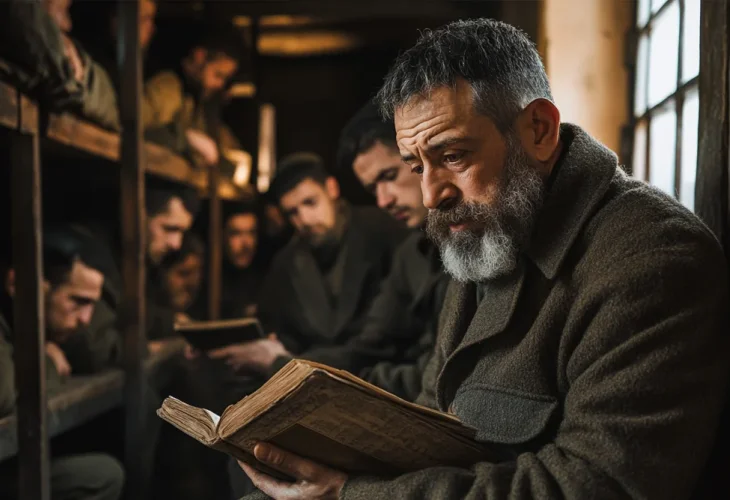History and Archaeology
Rabbi Yekutiel Neubauer: Light in the Darkness
Even in the Bergen-Belsen camp, Rabbi Neubauer brought Torah, guidance, and hope to suffering Jews

Hermann Neubauer was a well-known diamond merchant in Leipzig. At first, he knew nothing about Judaism. His father came from an intellectual family, and his grandfather, who had once studied in a cheder (a traditional Jewish school), had abandoned religion early in life. He considered himself a loyal son of Prussian culture and felt no connection to the Jewish past and certainly not to its present.
As Hermann became more involved in the diamond trade, he began to meet other Jewish merchants. Many of them came from Galicia and were observant Jews. This was something entirely new for him, Jews who were both traditionally religious in appearance and deeply honest, loyal, and caring toward one another.
The Jewish diamond merchants maintained warm ties, always ready to help one another. But when the holidays arrived, they would all disappear to the courtyard of the Rebbe. Hermann could not understand it. What could successful, intelligent, and wealthy men possibly find in the home of an elderly Jewish rabbi?
Eventually, curiosity won. Hermann decided to spend one Shabbat in the courtyard of the Rebbe of Belz. He returned deeply moved, and before long, he became a devoted Belz Chasid. His friends could not understand how a man of such intelligence could become a traditional Chasid, but reality spoke louder than their doubts. Hermann built a warm Chasidic home. His wife embraced the way of life with him, and their children grew up in a Torah-observant household.
Their eldest son, Yekutiel, was exceptionally gifted. At just 17, he became engaged to a respected family and studied Torah under some of the most prominent rabbis in Galicia. One of them was Rabbi Elijah Bombach, the rabbi of the town of Oswiecim (later known by its German name, Auschwitz), who also granted him rabbinic ordination. Alongside his Torah studies, Yekutiel also attended the University of Leipzig, studying Semitic languages and law, including Hebrew law. He even completed a doctoral thesis on marriage laws in the Talmud.
Although he excelled in the academic world, Rabbi Yekutiel returned to full-time Torah study, turning away from a purely academic career. At the time, German universities were full of “Biblical criticism,” a field that questioned the divine origin of the Torah. Rabbi Yekutiel wrote a book refuting these ideas, causing quite a stir in the academic world. His research abilities were admired even by those who disagreed with him.
After World War I, Hermann Neubauer bought land near Regensburg with plans for a yeshiva led by his brilliant son, where Torah study would be combined with agricultural training for future immigrants to the Land of Israel. Before long, Rabbi Yekutiel was invited by Rabbi Yitzchak Dov Bamberger, the “Rabbi of Würzburg” and a leader of Orthodox Jewry in Germany, to teach at the prestigious Würzburg Teachers’ Seminary. His reputation grew there but when the Nazis came to power in 1933, he knew he could not stay in Germany.
He was offered the position of head of the Rabbinical Seminary in Amsterdam, and he moved to the Netherlands. But the Nazis reached there as well. On the 2nd of Iyar 5700 (1940), Rabbi Neubauer and his entire family were deported to the Bergen-Belsen camp.
Even in Bergen-Belsen, Rabbi Neubauer became a source of spiritual strength. He gave regular lessons in the Talmudic tractate Bava Metzia under the harshest conditions possible, as often as he could. He also answered halachic (Jewish legal) questions, even complex ones about agunot (women whose husbands were missing and could not remarry without proof of death). For four and a half years, in the very heart of the inferno, he radiated Torah, wisdom, and hope to the suffering Jews around him.
On the 8th of Nisan 5705, just days before the camp’s liberation, Rabbi Neubauer passed away, one of the countless victims of Bergen-Belsen. His wife survived and later immigrated to Israel, where she became one of the founders of the Ohel Nechama synagogue, established in his memory.

